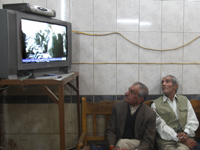Ronald Reagan’s landslide victory 28 years ago constituted a major turning point in U.S. history, one that signaled the transition from one era to another. Barack Obama’s victory represents yet another turning point. The question remains: Will this victory mark the dawn of a new political era, one that departs from the assumptions that underlie the Reagan era?
The Democrats’ landslide victory over their Republican opponents in house and senate races and Obama’s seizure of the White House represent a harsh indictment of George W. Bush’s presidency, one that has seen the highest disapproval ratings (71 percent) recorded by Gallup. Will the Democrats’ victory in 2008 mark an ideological transformation similar to the one initiated by Reagan’s election in 1980? In the context of a financial crisis that has revealed the failures of deregulation and the difficulties facing the United States in Iraq, Afghanistan, and the war on terror, any success that the Democrats achieve will reflect not only popular rejection of Bush’s policies, but more importantly, rejection of Reagan’s philosophy. Indeed, such success might mark the end of the “Reaganite era” that has dominated U.S. policy over the last few decades.
Bush’s policies—carried out under the banner of making the United States and the world safer—have led to wars as well as political and economic crises. These policies have thus turned the United States into a unilateral player, inspired by a sense of superiority and by Christian ideology. This unilateralist stance has broadened the threats against U.S. security and expanded the scope of global instability. This political and military reality is paralleled by the worst economic crisis since the 1920s, a crisis that has had severe effects on developed and developing countries alike.
It is in the midst of this complex web of political, military, and economic challenges that Obama will assume the presidency of the United States. As he tries to restore economic and political security to the United States, however, he will be forced to take the interests of other countries into consideration.
The principal challenge facing Obama will be dealing with Bush’s proclaimed objective following September 11, namely making the world safer. If anything, military intervention and unrestrained capitalism have left the world a more dangerous place. This legacy will force the new administration to adopt a more pragmatic approach, from increasing cooperation with allies and major countries, to drawing on their help to restore the role of the United Nations in dealing with explosive international issues. Financially and militarily crippled, the United States can no longer address these challenges unilaterally. The question remains: Will Obama succeed in changing America’s image abroad?
There is no doubt that Obama’s intellectual and attractive personality is reminiscent of former president John F. Kennedy’s charm, leading some to describe Obama as the “black Kennedy.” Former French Prime Minister Dominique de Villepin has commended Obama’s beautiful campaign slogan, “Yes We Can.” However, he added: “Because Obama has become the symbol of change, the situation will be more difficult. High expectations necessarily mean a high risk of disappointment, which means that Obama will have to come up with quick solutions to present to the American public.” Obama will have to choose between setting his priorities and facing impatience, because Wall Street and the financial markets are not easy partners to deal with, and neither is an American society that remains cautious and watchful of every step.
With regard to the Middle East, nobody has any illusions regarding a change in the long-standing alliance between the United States and Israel. It will be very important, however, for Obama to adopt a policy that prioritizes defusing tensions in the region and finding a solution to the Israeli–Palestinian conflict. Obama will also need to organize the U.S. withdrawal from Iraq and adopt a diplomatic course in dealing with the problem of Iran and talking with Syria. If tensions decrease in the region, Obama might approve of European intervention in unraveling problems in the Middle East.
When it comes to Syria and Lebanon, Obama is expected to resume dialogue with Syria, especially as he vowed to talk to everyone without compromising core U.S. principles, such as respect for Lebanon’s sovereignty, commitment to U.N resolutions, and the UN tribunal’s prosecution of the killers of former Lebanese prime minister Rafiq al-Hariri. The problem of Gulf security presents a serious dilemma, however. On the one hand, it cannot be solved without Iran’s participation, on the other Iran cannot be accepted as a legitimate partner unless it gives up its nuclear program. But the failure to resolve the problem of Gulf security might have serious political and security consequences, and perhaps even military ones, that might in turn drag the entire world into a large-scale destructive war.
Finally, Obama will have to make a choice between supporting democracy and human rights in the Middle East or giving them up and prioritizing the political stability of friendly regimes. Policies toward Iraq, Jordan, and Yemen, and the extent to which Egypt and the Gulf countries are pressed to democratize and protect liberties, all will be a test of Obama’s choices.
Dr. Ahmed Saif, Director of the Saba’ Center for Strategic Studies – Sana’a, Yemen.




